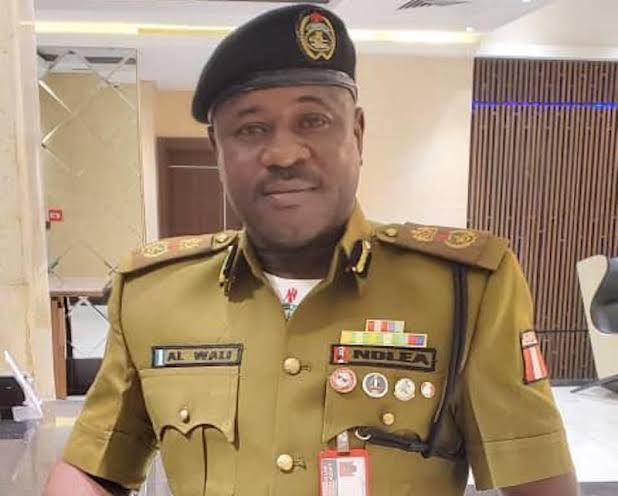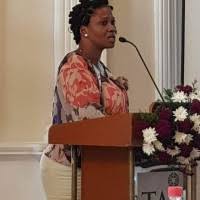
Commander, NDLEA, Lagos
The National Drug Law Enforcement Agency (NDLEA) has advocated a drug-free society in its ongoing war to reduce the misuse and abuse of drugs in the society. The Commander of the NDLEA in Lagos, CN Abubakar Liman Wali called on all stakeholders and the general public that it takes collective capacity to combat the drug menace in the country. He made this call at a 2-day workshop designed for senior officers of both military and paramilitary units in Nigeria.
In his opening remarks at the Drug Sensitization and Workplace Drug Prevention Workshop for Law Enforcement Officers themed ‘Drug Abuse Prevention and Management Program’, the head of the NDLEA in Lagos, CN Abubakar Liman Wali cited: ‘As we are all aware, the landscape of drug trafficking and abuse is evolving rapidly and our commitment to adapt and strengthen our defense is crucial to effectively counter these threats. This training is strategically designed to enhance our leadership skills, improve inter-agency collaboration, in seeking a solution to the multifaceted challenges arising from drug abuse.’
‘The primary objective of this gathering is not only to equip with knowledge but also to foster a shared vision of a drug-free society through cohesive action. We believe that with rigorous training and shared experience, we can build a robust network of proficient officers ready to tackle the complexities of drug related crimes and illness arising from drug abuse. Together let us forge a path that leads to a safer and healthier Lagos, aligned with our National aspirations.’
The Assistant Commander General of Narcotics and Coordinator of the National Drug Control Master Plan Secretariat of the NDLEA, Abuja, ACGN Ibiba Odili explained: ‘The National Drug Control Master Plan is very significant to addressing Nigeria’s drug problem because it is multisectoral. This plan has a five-year plan, 2021 to 2025. It is a plan that is based on continuity principles. We have had three editions in the past. Very soon we will be talking about a new plan. And that is why we need to address the level of implementation. We need to assess the level of our drug problem because these are feedbacks that will be ploughed into the next level of implementation. That is why we give these facts and figures. Where we were in 2021 is more complicated than where we are now.’
‘We should be worried because, like the National Drug Use Survey of 2018, which tells us that 14.3 million people approximating 14.4 have already used at least one psychoactive substance. And that survey also tells us that 20% of those people are already having substance use disorders. And we see that with that survey, more women are getting involved in the use of the drug. And also the issue of high-risk drug users are also involved.No psychoactive substances, mental health use disorders. But coming to current realities, we see that those statistics are even a far cry from what we have today. So it is important for us to be very, very worried because the health and security, which is the goal of that NDCMP and which is required for national development, will not occur if we don’t pay attention to implementing every aspect of the plan.’
‘These activities address the issue of technology as it relates to drug demand and drug supply is also embedded in the plan. And the issue of children is also embedded in the plan because, like I said, when young people use drugs, especially children, it is more complicated, both in treatment, both in prevention.So it is important for us to all pay attention as parents, as caregivers, and as policymakers, and as development strategists to ensure that we address the issue of children using drugs in Nigeria.’
‘Every stakeholder is involved in the implementation.It’s not a one-man show. It’s not just NDLEA as a focal agency because the drug problem is multifaceted, so every institution involved is on board in the Master Plan. And that is why it is significant because it is expected to address every aspect of the country’s drug problem and to find solutions and to see that it helps us to get through national developments.’
The Master Trainer at the United Nations Office on Drugs and Crime in Nigeria, (UNODC), Mrs. Maria Ilugbuhi said: ‘Tackling the drug issue is everybody’s business. Prevention is everybody’s business. Supply reduction is everybody’s business.Demand reduction is everybody’s business. Farm reduction is everybody’s business. Of course, there’s a public agency, which is the National Drug Manifestation Agency. But, like you heard them say, they can’t do the work alone. So, they need everyone to come on board. They need collaboration.They need cooperation. They need people to also help them to implement certain parts of this big problem that we have in Nigeria.’

UNODC Master Trainer
‘First, it’s very sad that you have pregnant women who are taking drugs. It affects not only women, it also affects their babies. Of course, it depends on the kind of substances that they take. The one that is very, very common is alcohol, where you see women coming down with fetal alcohol syndrome.But, of course, women take other drugs, too. They take heroin, they take cannabis, cocaine, amphetamine-type stimulants. They take all those things, and it’s really sad. However, there is an intervention for pregnant women who are using drugs. Whether that is effectively implemented is what I cannot say. I don’t know how often they do assessments for pregnant women to find out if they have substance use disorders. Pardon me if they do. I don’t work in the health sector, but if it’s something they don’t do, I think it’s something that should be encouraged that they do.’
‘This is not only to help during the pregnancy period, but even after a period of when their children are like two years old. It will involve teaching them parenting skills, treating comorbidities, looking out for them in terms of housing, shelter, and employment’, Ilugbuhi concluded.